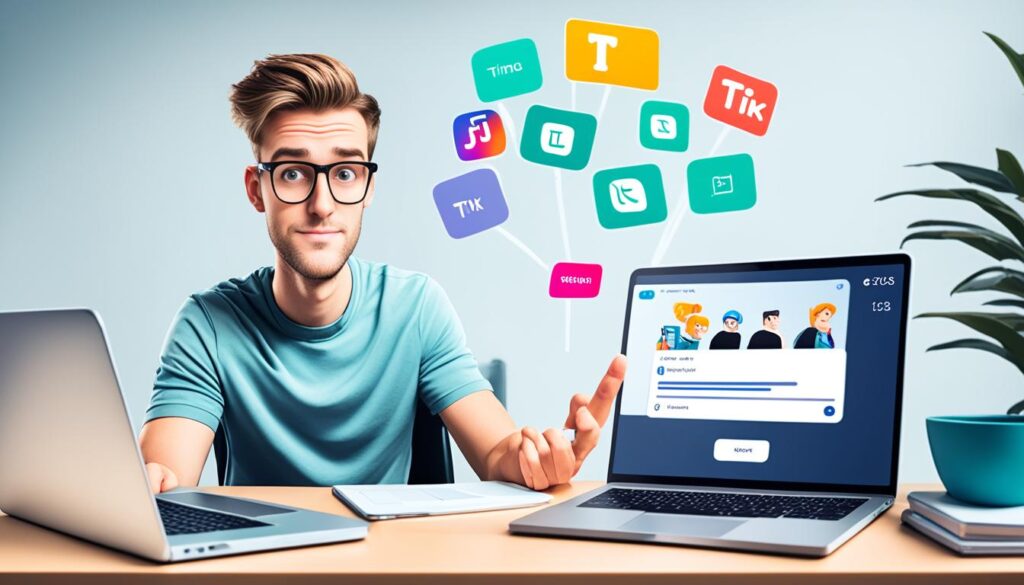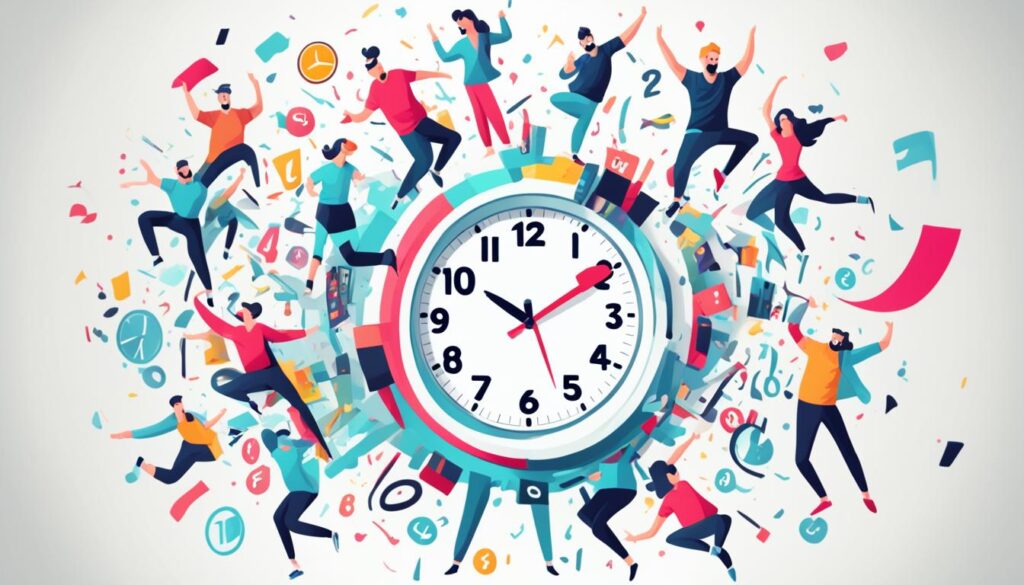TikTok has become a global phenomenon with over 1 billion users, many of whom are students. While the app offers a platform for creativity and connection, its impact on education and behavior is a matter of concern. Research suggests that excessive use of TikTok can negatively affect students’ grades and productivity. As an influential distraction, TikTok can hamper students’ ability to focus in class and complete their schoolwork efficiently.
Key Takeaways:
- The more time students spend on TikTok, the more distracted they become during class and while doing schoolwork.
- Excessive screen time on TikTok can lead to reduced productivity and slower academic progress.
- TikTok can distort students’ perception of time, making it challenging for them to plan their study schedules effectively.
- Multitasking with TikTok during learning is counterproductive and can hinder students’ focus and information retention.
- It is crucial for students to strike a balance between social media use and productive study habits to minimize the negative impact of TikTok on their education.
TikTok Increases Screen Time During Learning
The TikTok algorithm personalizes the content users see, making it challenging for students to put their phones down and focus on their studies. Many students find it tempting to stay on TikTok during schoolwork and in class, believing they can pay attention to both. However, research has repeatedly shown that multitasking is a myth and leads to distractions and slower learning.
“Multitasking is merely the opportunity to screw up more than one thing at a time.” – Steve Uzzell
One study found that students who checked their phones throughout a lecture wrote down fewer notes and achieved lower grades compared to those who put their phones away. Attempting to multitask with TikTok or other social media apps is unproductive in the long run and hinders students’ progress.
Why Multitasking is Ineffective
When we try to multitask, our attention becomes divided between multiple tasks, resulting in a decrease in focus and performance. Our brains are not designed to handle multiple complex tasks simultaneously. Instead, we switch back and forth between tasks rapidly, which leads to cognitive overload and reduced efficiency.
Unfortunately, this constant switching of attention between TikTok and learning materials hampers comprehension and retention. It takes time for our brains to refocus on a task after being distracted, leading to fragmented thinking and shallow understanding of the subject matter. Ultimately, attempting to multitask with TikTok during learning only serves to prolong the time required to complete tasks and decreases overall productivity.
Finding Focus and Maximizing Learning
To optimize learning and minimize distractions, it is crucial for students to create a conducive study environment free from digital interruptions. Here are some tips to enhance focus and productivity:
- Designate specific study periods free from TikTok or other social media use.
- Turn off notifications on your phone during study sessions to minimize distractions.
- Utilize time management techniques, such as the Pomodoro Technique, to structure study sessions and breaks effectively.
- Use apps or browser extensions that block access to social media sites temporarily.
- Implement concentration training exercises, such as mindfulness or deep breathing, to improve focus and attention.
By incorporating these strategies, students can create a productive and distraction-free learning environment, making the most of their study time and achieving better academic outcomes.

| Effect of TikTok on Learning | Outcome |
|---|---|
| TikTok use during study sessions | Distraction, reduced focus |
| Checking TikTok notifications during lectures | Lower grades, decreased note-taking |
| Attempting to multitask with TikTok | Decreased efficiency, fragmented thinking |
| Creating a distraction-free study environment | Enhanced focus, improved productivity |
TikTok Distorts the Concept of Time
When students engage with TikTok, they often find themselves unintentionally spending more time on the app than they originally intended. This can be attributed to the captivating nature of the content, which can put students in a state of complete focus, causing them to lose track of time. This phenomenon is known as time distortion.
Being immersed in TikTok can create a “flow state” where students become completely absorbed in the content, leading them to disregard the passage of time. Breaking this flow state without external interruptions can be challenging, as students may remain engrossed in TikTok even when they need to focus on other tasks, such as studying.
For students who already struggle with a distorted view of time, TikTok can exacerbate the issue. The addictive nature of the app makes it difficult for students to accurately estimate the time needed to complete tasks. As a result, they may underestimate the time required for studying and assignments, leading to poor time management and missed deadlines.
“TikTok’s influence on time perception can have a detrimental effect on students’ academic performance,” says Dr. Jane Simmons, a psychologist specializing in time management. “Students need to be aware of the planning fallacy that TikTok can perpetuate, and actively work on managing their study time effectively.”
Research has shown that students who spend excessive time on TikTok tend to struggle with prioritizing their education. When students prioritize TikTok over their study time, it can significantly impact their ability to succeed academically.
| Impact of TikTok on Study Time | Consequences |
|---|---|
| Underestimating time needed for assignments | – Poor time management – Missed deadlines |
| Lack of focus and concentration | – Reduced productivity – Inefficient studying |
| Inability to prioritize education | – Lower grades – Hindered academic progress |
To address this issue, students should actively manage their time and find strategies to minimize the impact of TikTok on their study routines. Establishing a structured study schedule, setting clear goals, and utilizing productivity techniques can help students regain control over their time and prioritize their education effectively.
Overcoming TikTok’s Distortion of Time Perception
Here are some practical tips for students to manage their study time in the face of TikTok’s time distortion:
- Establish a schedule: Create a daily or weekly study schedule that allocates specific time slots for study and leisure activities. Stick to the schedule, ensuring dedicated study time free from distractions, including TikTok.
- Set goals: Define clear, achievable study goals for each session. Breaking down tasks into smaller, manageable chunks can help prevent underestimation of time needed and provide a sense of accomplishment.
- Utilize time-blocking: Divide study time into focused blocks, eliminating distractions and allowing students to concentrate on their work. Use apps or productivity tools to set timers and monitor time spent on specific tasks.
- Practice self-discipline: Limit TikTok usage during study hours by turning off notifications or placing the phone in a separate room. Ensure studying takes precedence over social media engagement.
- Seek accountability: Find a study partner or join a study group to help maintain focus and hold each other accountable for staying on track. Sharing study progress and discussing challenging topics can enhance productivity.
In conclusion, TikTok’s time distortion can be detrimental to students’ study time and overall academic performance. By acknowledging and actively managing this influence, students can regain control over their time, improve their focus and concentration, and ultimately achieve academic success.

Conclusion
While TikTok can be an enjoyable platform for students to unwind, it is crucial to recognize its potential impact on their academic performance. Excessive use of TikTok can lead to distractions, reduced productivity, and poor time management skills, all of which can negatively affect students’ grades and overall education.
However, it is important to note that not all hope is lost. Students have the power to take control of their social media consumption and strike a balance between online entertainment and productive study habits. By implementing effective mobile phone management techniques and concentration training, students can successfully manage their device usage and minimize the negative impact of TikTok on their education.
Ultimately, students must prioritize their learning and make responsible use of social media platforms like TikTok. By understanding the potential consequences and actively working towards a healthier balance, students can unlock the true benefits of technology while achieving academic success.
FAQ
What is the impact of TikTok on students?
TikTok can have a negative impact on students’ education and behavior.
How does TikTok increase screen time during learning?
TikTok’s engaging nature makes it challenging for students to put their phones down and focus on their studies.
How does TikTok distort the concept of time?
TikTok can distort students’ perception of time, making it difficult for them to plan their study time effectively.
What are the effects of TikTok on students’ grades?
Excessive use of TikTok can lead to distractions, reduced productivity, and lower academic performance.

